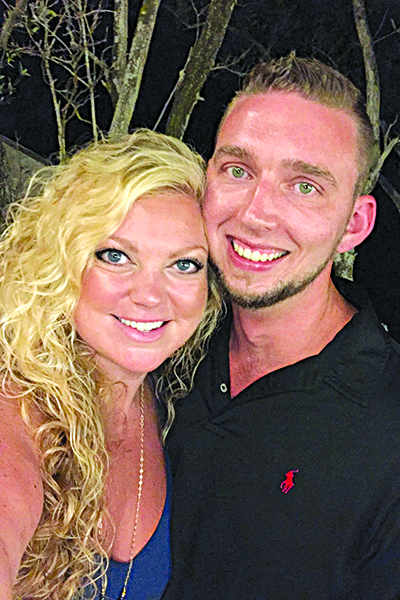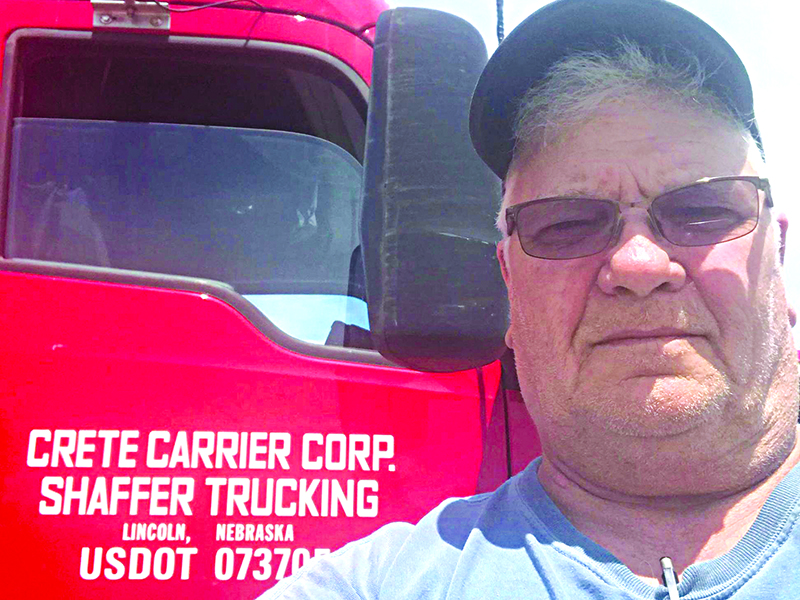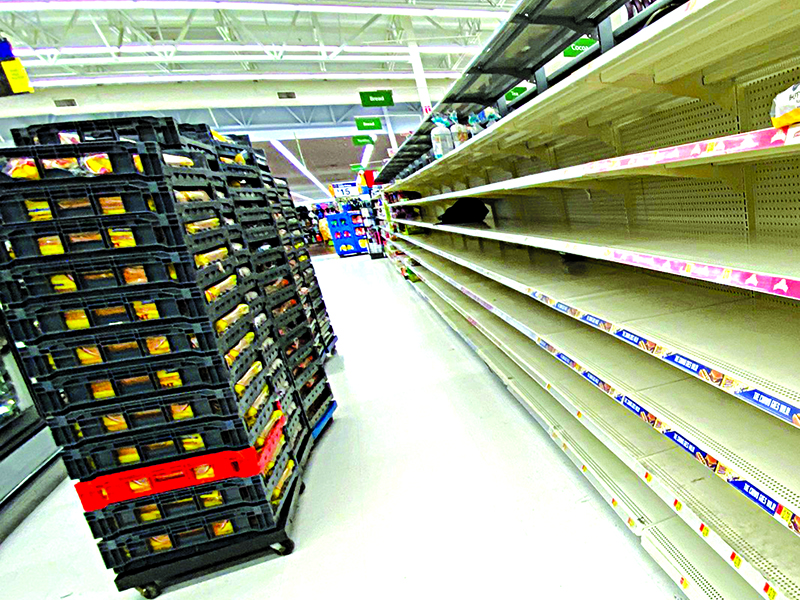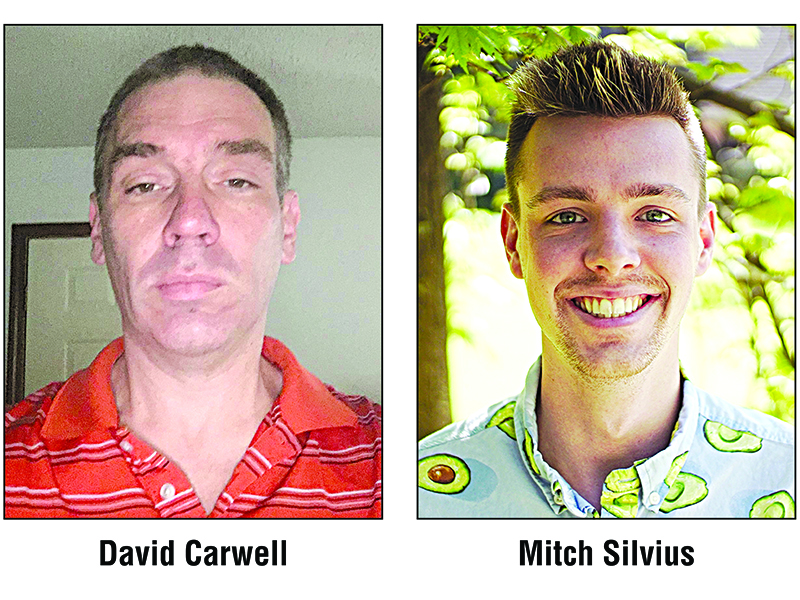Drivers, business owners busy during COVID-19 restriction era
An essential need during the coronavirus pandemic and its subsequent restrictions has been trucking and delivery services. Without them and the millions of tons of products they transport each year, America would truly be shut down.

The Times-Courier caught up with some local and long-distance delivery drivers in the last week, and asked them how their livelihood was being affected by the COVID-19 restrictions, and how they were conducting their transports.
James and Leah Barnes own their own company as independent distributors affiliated with Flowers Baking Company. They deliver bread in the area — by leaving their home at 3:30 every morning.
“It’s one of the most essential products during all this,” said Leah during a phone interview. She was asked how the virus restrictions have affected their business.
“It has not slowed down any at all — if anything, it’s launched us into what I’d call our summer numbers,” she said. “Typically, every summer when kids get out of school (and) things of that nature, we ramp up in volume. The coronavirus has certainly created that as shelter-in-places have been in effect.”
Barnes said the “biggest thing” the public does not understand is that there is no shortage of bread, and there is no breakdown in the supply chain.
“We make our orders a week in advance, and this all kinda happened overnight … but obviously there was a large scare, and we couldn’t keep bread on the shelves for a solid two weeks,” she shared. “And then when (the scare) stopped, it stopped — hard. So it’s been very up and down, but consistently on the up.”
Barnes said for people working essential services, “(The need) does not stop. We don’t get a break. There is no benefit of self-quarantine, no opportunity if you’re scared of exposure — you go to work every day.”
In that regard, she noted the precautions they take.
“We had a small supply of Lysol and Clorox wipes for around the house,” Barnes began. “We have tried the best as we can … the stores, like Walmart (and other grocers), have allowed us to come in earlier. Since the stores have modified their hours, we’ve been able to modify our delivery so we can try to get in and out before the doors open.
“That’s the biggest thing you can do to safeguard yourself, because the public does not care about social distancing when you’ve got bread. There were a lot of mornings I’d come in and there would be no bread on the shelves, and if I couldn’t get in there before the customers, they would bombard us … (so) that we would have to say, ‘Stop, practice your social distancing — it will be on the shelf in 15 minutes.’”
Asked about the future, Leah said, “We’re recession proof, pandemic proof, political proof, (so) we can survive it with our industry.”
She added that many stores are now requiring all delivery drivers to wear masks, even if they’re in stores before the doors were open.
Barnes was asked about eating meals during the day, since many restaurants are closed.
“A lot of us don’t pack a lunch. We don’t take a lunch break – it’s just grab and go and eat while driving to the next stop,” she replied. “It’s been incredibly inconvenient not to be able to park and go into a dining room and order, but most of us do have the opportunity (in that) the fast food (restaurants) we service have been really accommodating.”
David Carwell is the owner/operator of Ellijay Delivery Services, whose parent company is Marshall Garrett Moving.
“We’ve been looking at starting the delivery side for the past year,” he said, “but it came together around the middle of March (and) that’s when it all started. Our moving service is our bread and butter, but we just want to give the people in Ellijay and Gilmer County a local option for delivery.”
Carwell noted being an “essential business” designated by Gov. Brian Kemp has helped his company grow.
“With our business model and what we’re doing, it keeps people at home that need to be at home,” he said, adding the company will deliver from local grocery stores, restaurants or other businesses after a resident or renter places an order.
Because the mainstay of the company has been a moving business through the years, they can also pick up furniture items if that’s what a customer needs. Masks and gloves are worn throughout the delivery process, he said.
Carwell believes the delivery business will continue after virus restrictions are lifted, since the north Georgia mountain area has become a draw for retirees and the elderly. They have already begun delivering to assisted living centers in the area.
“It’s an inexpensive way to do business,” he said.
Mitch Silvius is the sole owner of Driveway Cafe (drivewaycafe.com, or on Facebook), a new business created in the wake of virus restrictions that delivers food from a variety of local restaurants to customers, and also offers other delivery services.
Presently, the startup services restaurants in Ellijay and East Ellijay, but plans are underway to expand outside Gilmer County.
Silvius was asked about the restrictions and how they apply to him.
“We started Driveway Cafe right after COVID-19 hit because of the need that it actually created, both to encourage the community to stay at home and stay safe, and kind of eliminating their need and their temptation on a daily basis to venture out to get food,” he said. “That was the main problem we saw that we aggressively wanted to solve, as quickly as we could.”
Silvius said he came up with the idea and launched Driveway Cafe in five days.
“Also, we wanted to help the restaurants that had lost a huge amount of revenue, and support them if they were not traditionally set up to do delivery,” he added. “In terms of slowing down, we don’t know since we weren’t even around before.”
What precautions do his delivery staff take?
“We offer no-contact delivery when we get to their home — delivering the food on the porch or on the table they have, at least 6-10 feet away from them,” he explained. “We have constant hand sanitizing throughout the day. We require our drivers to now wear masks, as well, based off our research that that is the best thing for everyone staying safe throughout the day.”
Does he envision a future for his services?
“We hope everything gets back to normal as quickly as possible, just for the benefit of everyone and the businesses and things like that,” he began. “When that happens, we are very excited about being able to stay (in business). Our business model is set up to work perfectly fine when things go back to normal, long after Covid-19.
“The whole area right now has lost a lot of tourism. When that comes back, we’re looking forward to serving them, the people out in cabins … it might end up to us growing significantly, even more so than we’re doing right now.”
Wayne Bickel is an over-the-road truck driver for Crete Carrier Corp., which owns around 6,500 trucks and is based in Lincoln, Neb. The Times-Courier caught up with the Ellijay resident in Kentucky, and he gave a broader perspective based on his travels. He was asked about the virus restrictions on the Crete company.
“It hasn’t really impacted us because we haul a lot of paper products — like toilet paper, paper towels and hand sanitizer, among other items,” he said, noting he delivers from the East Coast west to Colorado. “The biggest thing that impacted us in the beginning was when they put some of these rules in place — they didn’t quite think about them.”
He was asked to explain.
“The governor of Pennsyvania closed all the rest areas right off the bat, you couldn’t park your trucks in there,” he replied. “Now I could understand him closing the buildings, but leave the parking open for the trucks. Because if it’s not safe for trucks to park together there, how’s it safe for cars to park next to one another at these Walmarts and supermarkets?
“We’ve kept moving, and it’s just the last two weeks we’ve slowed down because everybody’s out of work and a lot of places aren’t open to manufacture stuff.”
Bickel said his company has seen “a big demand” for scrap paper for recycling into the paper mills.
“They’ll boil it down and make toilet paper, paper towels. Our paper products are not all from fresh, new trees,” he pointed out.
Bickel was asked if he’s seen any easing of restrictions.
“I was just down in Jackson, Ga., and was on my way up here (to Kentucky) with this load, and I stopped at a Flying J (truck stop) in Jackson,” he said. “That was the first time I was able to sit down inside a Denny’s and have a meal without having to eat in the truck. That was one big thing, having to eat in the truck all the time, unless you found a place that had tables outside, and most truck stops don’t have that.”
Bickel, who is from upstate New York, bemoaned the restrictions put on the state because of the COVID-19 epidemic in New York City.
“Out in the far country, my nearest neighbor was a half a mile,” he revealed. “Why should we be restricted like that? It’d be like Atlanta and Ellijay!”
What does he see when the coronavirus scare has run its course?
“It’s going to get better,” he believes. “Everybody’s going to be back to work pretty soon.”
From traveling cross-country on the highways, what has been the mood of Americans during the various lockdown orders? And is it changing any?
“We don’t get to see people during the lockdown, but I haven’t been in a traffic jam since this thing started and people started staying home,” he noted. “We blow through Atlanta, we blow through everywhere! I called my wife one day and said, ‘You know what? I kinda miss the traffic jams.’ But most of the places we (deliver) to now, I’m not allowed in the building. I have to ring the buzzer, then go back down to the bottom of the steps and the guy comes out withhis mask on to see me and take my paperwork.”
He said at an I-75 weigh station south of Atlanta, he was given a free mask by the highway authorities. On Saturday, Bickel was headed to Indiana and then on to Missouri. He typically stays on the road three weeks at a time.
Delivery services on Facebook
• Ellijay Delivery Services
• Drivewaycafe.com



